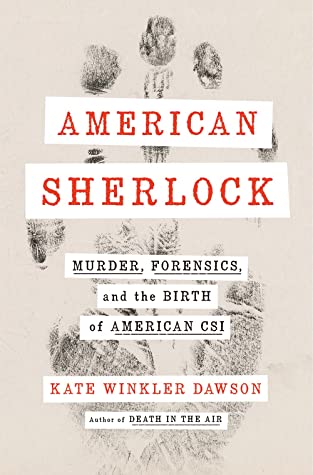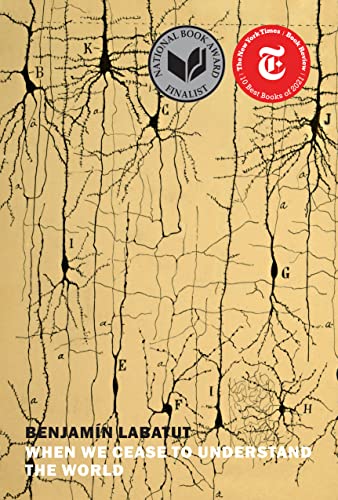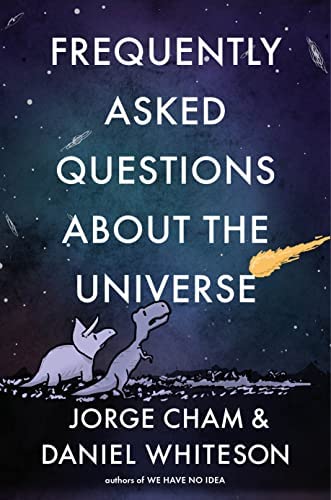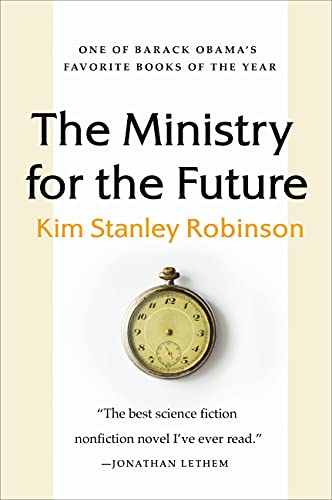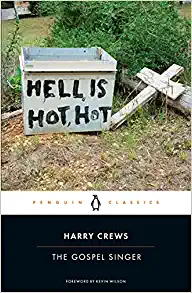Each year, I like to reflect on the best things I’ve read over the course of those twelve months and share some of my favorites. With so much going on personally this year, I didn’t read nearly as much as I have in the prior few years. When I did read, I found myself reading more fiction than nonfiction… rare for me as I usually only read one or two fictional books a year. Still, I found several things that enriched me and occupied my mind. In this post, I’ll share seven of those books from 2022.
You can read last year’s favorite books here.
American Sherlock: Murder, Forensics, and the Birth of the American CSI
by Kate Winkler Dawson
American Sherlock is a biography of Edward Oscar Heinrich, widely considered one of the most influential early forensic scientists. While I work within the realm of digital forensics that predates Heinrich, there’s still much to be learned from studying the history of traditional criminal forensics. Not just in technique, but in how the field evolved, the challenges it faced, and how it learned to operate within the world to achieve meaningful goals. Dawson frames Heinrich’s story through the cases that were most significant to his life and career, which is common for these sorts of biographies.
For each case, Dawson provided the facts as they were known to Heinrich at the beginning and the processes he used to eventually reach a conclusion when one was attainable. While scientific discovery and application were involved in each case, I appreciated the broader view of how the reality of the legal process affected the results of each trial. The science was often clear, but the presentation of its findings and their interpretation in the courtroom usually was not. This challenge was a great example of how science doesn’t exist in a vacuum and demonstrates that the job isn’t done until a practitioner presents discoveries and analyses in a relatable and understandable manner.
If you’re interested in the history of criminal forensics at all, then you’ll find Heinrich’s story compelling and essential for understanding the development of the field. From a scientific perspective, you’ll learn about blood spatter analysis, early forms of ballistic analysis, how grains of sand helped determine where a murder occurred, and much more. You’ll also learn bout Heinrich as a man, his obsession with his work, and the ups and downs that resulted from his brilliance and acclaim. I’ve read many histories of forensic science, and American Sherlock is one of my favorites.
When We Cease to Understand the World
by Benjamin Labatut
I’ve never read a book quite like When We Cease to Understand the World. It’s described as a work of historical fiction, in this case meaning that it borrows from history but takes certain creative liberties with the facts. The book’s central theme is, as the title suggests, the importance of understanding the world around us, how we think about it, and the consequences of action or inaction around those ideas. These topics are explored through the lens of individual scientists, many of whom you’ve likely heard of before: Planck, Schrödinger, and Heisenberg to name a few. The book is broken up into only five stories, with each essentially being a chapter. Labatut tells how each subject made some of their most profound discoveries — some leading to tremendous good in the world, and others to wide-scale suffering. Throughout, there are moments where you’ll consider how knowledge is rarely neutral. Even though portions of the book are fiction, the questions it will provoke you to ask are incredibly real and perspective-shifting. I started reading the book expecting just to get an idea of what it was about and ended up finishing it within the same day. It’s been several months, and I still think about it frequently.
The only issue with the book is that it’s not clear at all which elements of these stories are facts and which are fiction, and to perform the research to disentangle the two would be incredibly time-consuming. As such, I worry that my knowledge of the actual lives of these scientists may, at some point, conflate with the fictional elements of these stories. Regardless, Labatut’s work took me on an enjoyable journey that evoked a tremendous about of wonder, curiosity, concern, and a wide array of other emotions.
Of all the books I’ve written about this year, it’s this book that I fear my review won’t do enough justice. But, it’s a book I enjoyed reading so much that I’ll likely come back to it again for a reread, which is something I rarely do.
Frequently Asked Questions About the Universe
by Jorge Cham & Daniel Whiteson
I’ve built my writing career on the ability to break complex topics down into language that makes them easier to learn and understand. As you might imagine, that means I have a deep appreciation for others who do this well, particularly among topics that I find complex and hard to follow. When I stumbled across Frequently Asked Questions About the Universe in a Greenville, SC bookstore, I immediately knew I had found a couple of authors who did that well. Cham and Whiteson approach one of the complex topics to be found — the universe — and answer some of the most common questions people have posed.
There’s artfulness in multiple ways here. That starts by identifying the right questions and stating them in the simplest way. The universe is big (as if you needed me to tell you that), so if the questions cover too broad an area, they become unwieldy and impossible to answer cleanly. If the questions are too narrow, then they may get too technical or cease to provoke curiosity. Cham and Whiteson took care to stick with questions that were wide in scope but narrow enough that it allowed them to write focused answers that don’t include so many working parts that they are incomprehensible. These are questions like “Why can’t I travel back in time?”, “What happens if I get sucked into a black hole?”, “Will time ever stop?”, and my personal favorite, “Why do we ask questions?”. Each chapter of the book is dedicated to questions like these and others.
Answering these questions traverses many realms… biology, physics, genetics, astronomy, and even religion in a scientific sense. Yet, the authors manage to interweave them to describe what we know and don’t know about the universe and ourselves. As you might expect, almost none of these questions have simple yes or no answers. Instead, it’s more like “Based on what we know now…” or “If we assume this, then…”. These statements are the language of science and nuance, and the book does a tremendous job using that language in a way that will help others speak it too. If you read this book, you’ll almost certainly learn more about our existence, but more importantly, you’ll be left curious and inspired to explore.
The Ministry for the Future
by Kim Stanley Robinson
The Ministry for the Future is a fictional work set in the near future that centers on the catastrophic global effects of climate change and how a series of individuals and organizations worked together to reverse the effects of human-caused global warming. The story is told through the eyes of a series of key individuals around the world who are either impacted by the devastating effects of climate change or are actively trying to combat it through government and private means. The centerpiece of the work is the Zurich-based organization for which it’s titled, led by Mary Murphy, a composite character based on several real diplomats.
I’ve read plenty of nonfiction about climate change that describes the grim future we might all experience if no actions are taken. This book helped humanize and drive home the complexity of implementing some of the large-scale solutions required. Robinson did his research, bringing aspects of climate science, glaciology, and geo-engineering that seemed to jive with much of the science I’ve read. Of course, it’s still fiction, so some of the solutions that are described aren’t entirely feasible or realistic. Nevertheless, it’ll provoke your curiosity and send you off to Google to learn about the temperatures of sub-glacial sea floors, the dispersion of sun-blocking agents into the atmosphere, the feasibility of country-sized solar panel arrays, and more. Ultimately, I found the book to be a hopeful account of how a small collection of motivated people can rise to meet an occasion and dramatically change the world, as it happens so many times in history. With so much doom and gloom to be found in discussions of climate change, I appreciated the outlook here.
The Gospel Singer
by Harry Crews
Earlier in the year, a friend recommended I check out Harry Crews Biography of a Place, an account of his rural life growing up in south Georgia. Within just a few pages I was mesmerized by his writing style and ability to relay the southern tongue. After finishing that book, I immediately purchased The Gospel Singer, his most popular work of fiction. While I don’t know that his work will appeal to just anyone, he’s quickly become one of my favorite authors, and I’ve got a few other titles in my queue to read.
The Gospel Singer takes place in the town of Enigma, GA (that’s a real place) where a young woman has recently been murdered. The town’s prodigal son, a famous gospel singer, returns home to deliver a concert a couple of days later. The story details his visit, his connection to the people of Enigma, and the torment within him. Whatever you think this book will be based on my description or the official summary, I’m certain you’ll be surprised.
The book is short but mesmerizingly engaging. I’ve never read anyone who writes like Crews; the closest I could think of was Flannery O’Connor, but Crews is much more accessible.
Stranger in a Strange Land
by Robert Heinlein
I’ve felt like a stranger in a strange land for most of my life, for various reasons. It was truly for that reason alone that I was drawn to the book of that same name initially, but once I read the summary, I knew it would be worth my time to dive in. Heinlein’s book is considered one of the defining works of science fiction and among the half dozen considered essential reading by those who make such lists. While I’m rather particular about the types of science fiction that interest me (see earlier lists to get a sense of what I like), this book hit the mark.
The story centers around Valentine Michael Smith, a martian who comes to Earth after a failed expedition to the red planet. The book initially focuses on the time just after he arrives and his interactions with the people immediately around him. Eventually, Smith goes out into the world on his own and founds his own religion. Like good science fiction does, Stranger in a Strange Land forces you to think about elements of society that you may have never considered from a neutral stance, the way someone from another planet might interpret (or should I say, grok) the concept. Sparking that sort of deep thought and subsequent conversation is the peak of good fiction for me. I think we could all benefit from occasionally thinking like a stranger in a strange land.
Even if you’re not into science fiction, I think Stranger is much more accessible than other vaunted works like The Foundation or Brave New World. As such, it’s probably a fantastic gateway into the genre as well as something enjoyable for the casual science fiction reader.
The Grieving Brain
by Mary-Francis O’Connor
In 2022, my wife was diagnosed with glioblastoma, an incurable form of brain cancer. A year later, she’s still here and doing about as well as we could hope for, but we know that won’t last and it’s been tremendously difficult for us to deal with. I’m no stranger to grief, having dealt with the loss of my mom and sister when I was in high school. People deal with grief in many ways, but as an adult, I’ve found an ability to better handle my grief by understanding it. The Grieving Brain was the book that helped me along that path.
In this book, the author focuses on grief from multiple viewpoints while remaining rooted in a psychological perspective. She describes how our brains create maps of our regular lives and interactions, and how the loss of people close to us rock the foundations of those maps and send us down a spiral of despair. As she states, the death of loved ones makes us walk in two worlds… the one in our brain where they are tied to everything and the one in reality where they are nowhere to be found. The Grieving Brain also offers meaningful advice on coping and coming out the other side that goes well beyond your typical five stages of grief…
Your brain continues to note the fact that your loved one is no longer present day after day and uses that information to update its predictions about whether they will be there tomorrow. That is why we say that time heals. But actually, it has less to do with time and more to do with experience.
I would expect that, even while rooted in science, The Grieving Brain will mean different things to different people based on how they experience grief, their disposition, and their views about the universe and religion. Still yet, I think there is something for everyone in this book who finds comfort in understanding emotions and how our brains react to our experiences. This book has helped me cope, and I would imagine it will continue to do so as my family and I continue along our path.
Next Year
After finishing my dissertation at the end of 2021, I had plans to read a lot more in ’22. However, life dealt us a poor hand and that limited how much I read and affected the sorts of things I was interested in reading. I suspect 2023 will be a year of taking things as they come, so I’m not setting many goals or plans about what I’ll read next. I’ve got a big stack of books on the shelf waiting for me, and I’ll look forward to digging through them as time is available and the mood strikes me.
Did you have a favorite book you read this year or a recommendation you think I’d like? If so, I’d love to hear about it in the comments or on social media.
